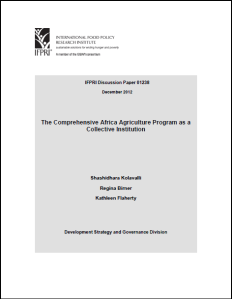 This year marks the ten year anniversary of the Comprehensive Africa Agriculture Development Program (CAADP), developed in 2003 as an initiative of the New Partnership for Africa’s Development (NEPAD). As part of a renewed focus on the agricultural sector by both African governments and donors in their development efforts, the goal of CAADP is to achieve poverty reduction and food security through sustainable agricultural growth. However, few African countries have yet to fully reach their commitment of a government budget allocation of ten percent to agriculture with the goal of achieving six percent agriculture-led growth. According to an IFPRI discussion paper titled The Comprehensive Africa Agriculture Program as a Collective Institution, the future success of CAADP will depend upon the response of African governments and donors to the unique potentials and challenges posed by the Program as well as its effective use as an instrument to achieve agricultural growth.
This year marks the ten year anniversary of the Comprehensive Africa Agriculture Development Program (CAADP), developed in 2003 as an initiative of the New Partnership for Africa’s Development (NEPAD). As part of a renewed focus on the agricultural sector by both African governments and donors in their development efforts, the goal of CAADP is to achieve poverty reduction and food security through sustainable agricultural growth. However, few African countries have yet to fully reach their commitment of a government budget allocation of ten percent to agriculture with the goal of achieving six percent agriculture-led growth. According to an IFPRI discussion paper titled The Comprehensive Africa Agriculture Program as a Collective Institution, the future success of CAADP will depend upon the response of African governments and donors to the unique potentials and challenges posed by the Program as well as its effective use as an instrument to achieve agricultural growth.
This paper examines the challenges involved with collective action by African governments and donors. African countries are often lumped together and stereotyped by the perception of poor governance or aid abuse by a few, affecting donor’s willingness to provide aid. CAADP, with its image of being an “African-owned” initiative, is an attempt to develop a collective reputation of Africa’s commitment to agricultural investment and growth, providing the opportunity to increase aid flows from donors. However, challenges arise because a collective reputation increases incentives to free ride: countries could take advantage of the improved reputation to receive aid while neglecting to follow up on their commitments. This creates a collective action problem because countries can create investment plans and strategies but never implement them, hurting member countries by undermining the CAADP reputation. On the donor side, a coordination problem can occur as donors have a strong incentive to support individual projects aligned with their own procedures; however, this undermines the efforts of strengthening the country’s own institutions and harmonizing aid efforts.
The authors suggest that compliance mechanisms must be established to ensure that collective action problems are overcome. NEPAD has developed a strategy of persuasion to encourage countries to follow a specified process of implementation, aligning the country’s development and agricultural strategies with CAADP framework. In addition, a number of supporting organizations, such as the NEPAD secretariat, are assigned to support the CAADP implementation process. Finally, monitoring and peer pressure can be effective in addressing the free rider problem. The paper recognizes the important role that the Regional Strategic Analysis and Knowledge Support System plays in this respect as it facilitates evidence-based policymaking and monitoring of performance.
To read the full report, click here
